The Trump administration has introduced a new immigration directive that could impose hefty fines and potential imprisonment on undocumented migrants who fail to register with the federal government. The Department of Homeland Security (DHS) issued the directive as part of its broader effort to reinforce stricter immigration enforcement policies, signaling a significant crackdown on undocumented migration.
According to a DHS spokesperson, the administration is fully committed to enforcing all immigration laws without exception. Officials emphasize that tracking individuals within the country is a matter of national security, arguing that undocumented migration poses potential risks. Under existing federal regulations, immigrants over the age of 14 who were not fingerprinted when applying for a U.S. visa are required to register if they remain in the United States for more than 30 days. Additionally, those over 18 must carry proof of registration at all times.
Since returning to office, President Donald Trump has prioritized immigration enforcement, declaring illegal immigration at the U.S.-Mexico border a national emergency. His administration has already moved to dismantle the CBP One program, a system introduced under the Biden administration that allowed migrants to schedule appointments for legal entry into the U.S. through a mobile application. Critics of the rollback argue that removing the program will leave many migrants stranded and could contribute to an increase in unauthorized border crossings.
The new directive signals a major policy shift toward stricter immigration measures, aiming to tighten border security while increasing federal oversight of undocumented migrants already within U.S. borders. Supporters of the policy argue that tougher registration requirements will enhance national security, ensure better tracking of migrants, and discourage illegal entries. However, immigration advocates and human rights organizations have raised concerns about potential violations of migrant rights and the risk of increased detentions and deportations.
With immigration expected to remain a contentious issue, the directive is likely to face legal challenges from advocacy groups and Democratic lawmakers who oppose restrictive immigration policies. As enforcement mechanisms take shape, the impact on migrant communities across the country remains uncertain.

